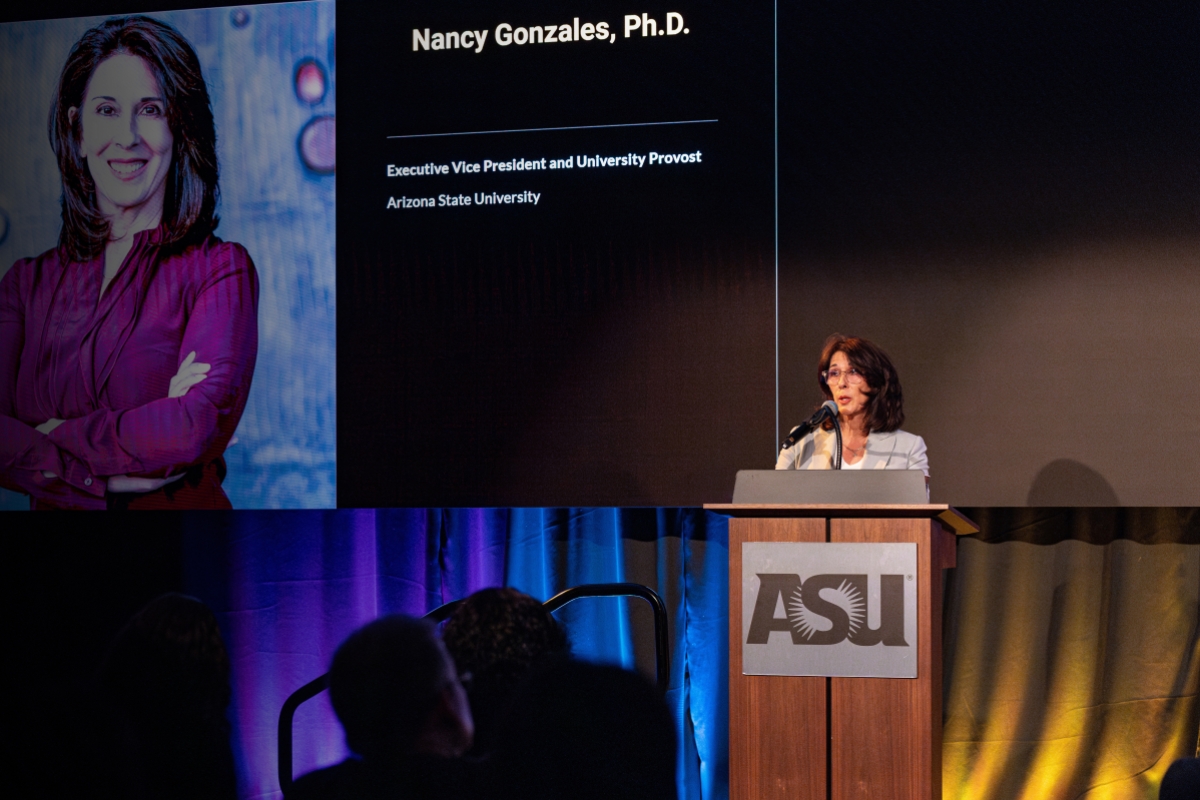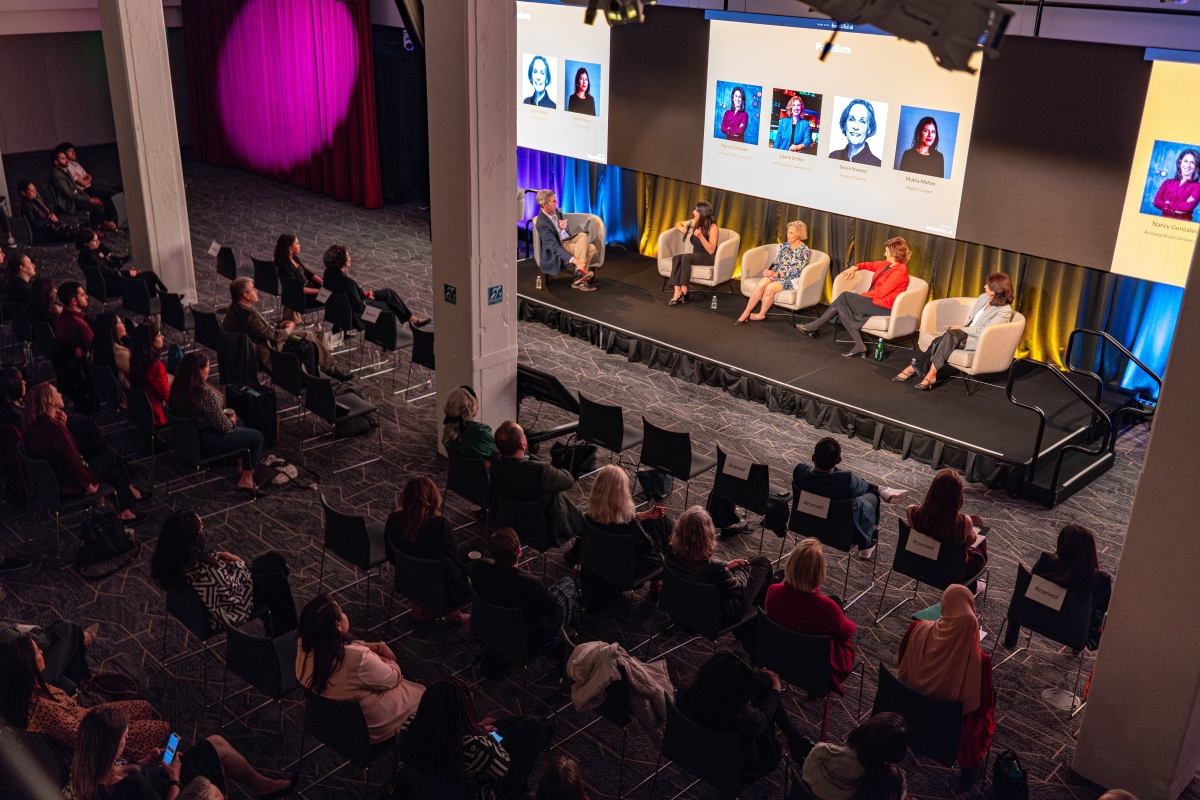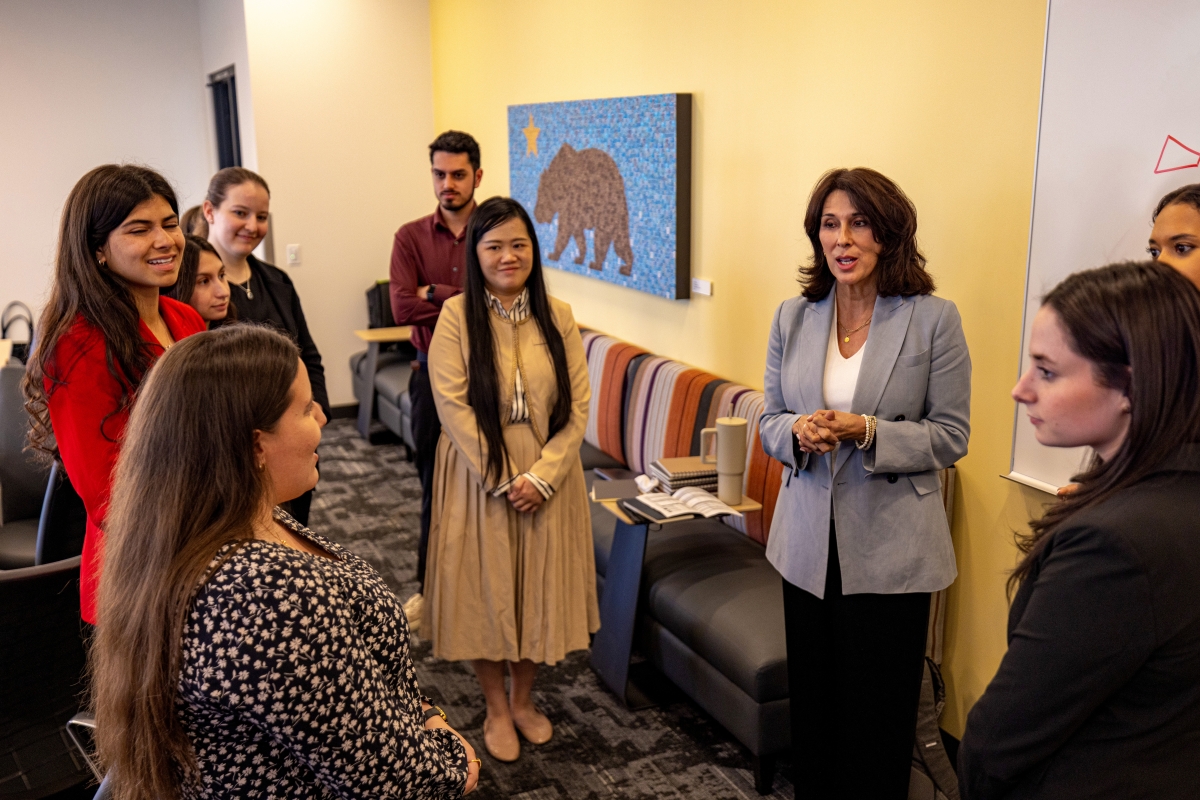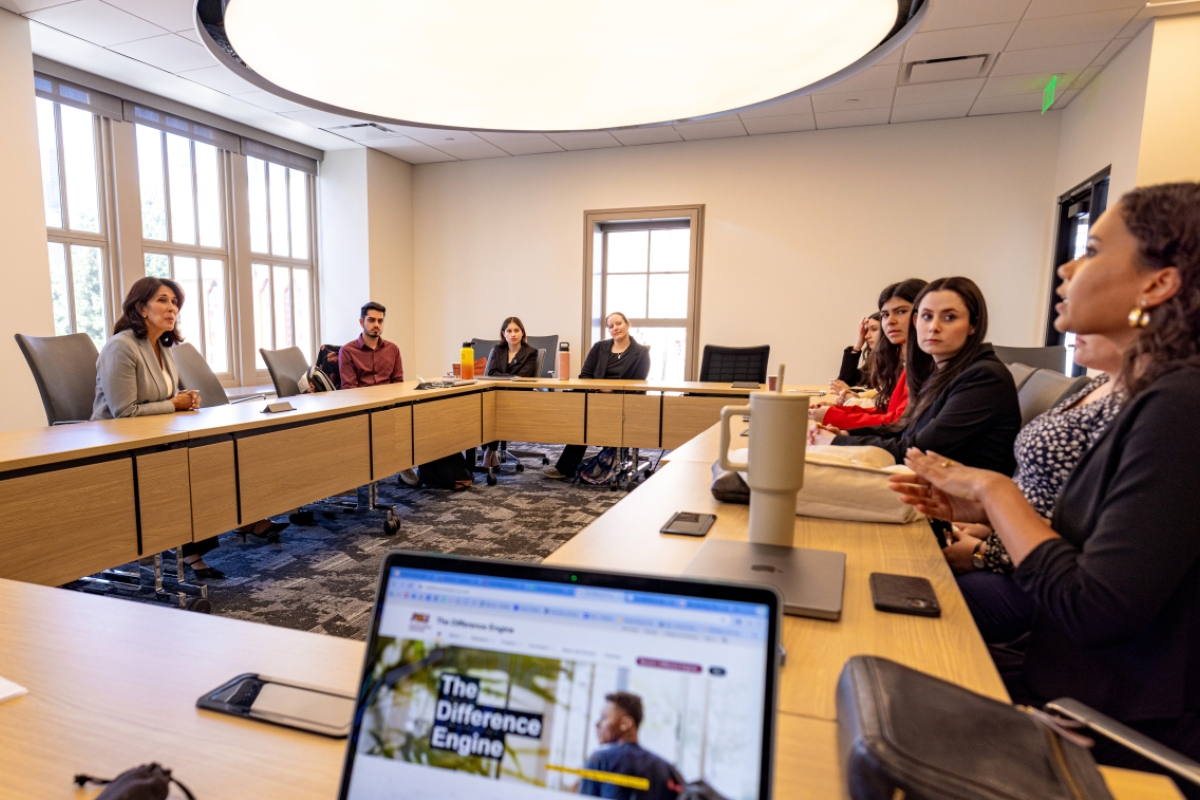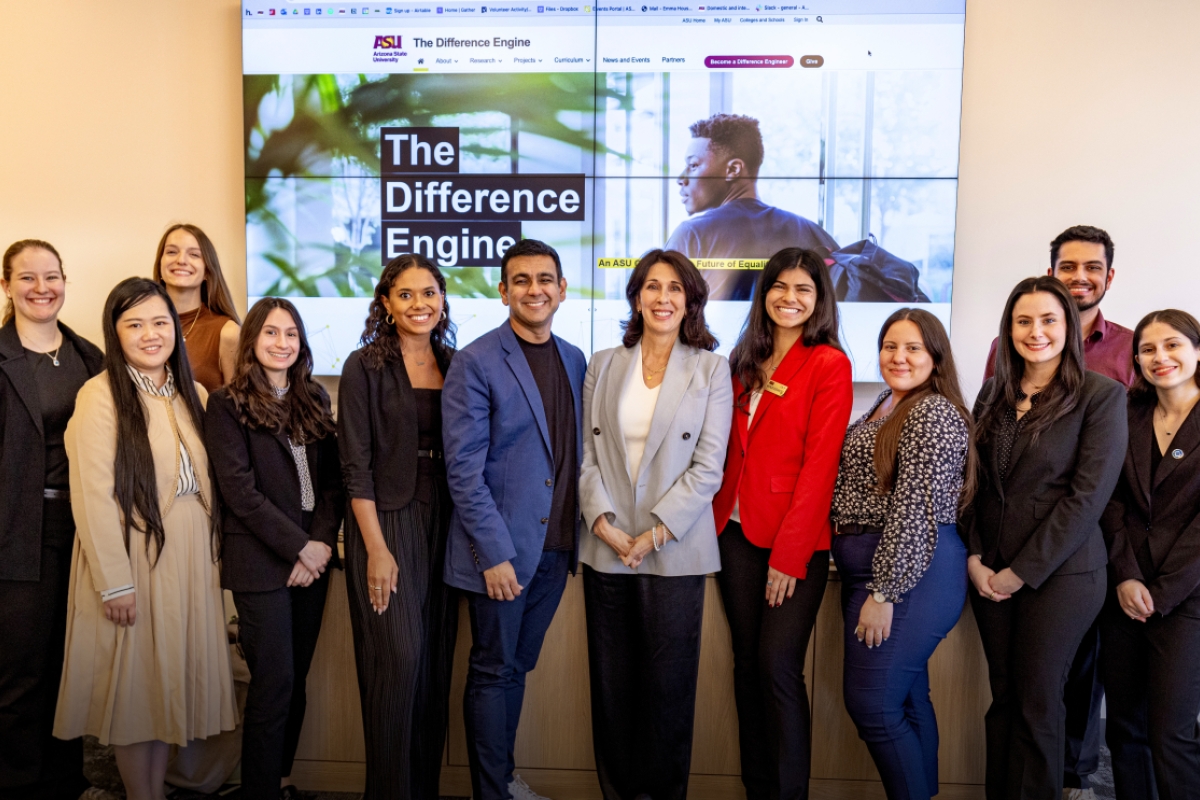ASU index ranks 12 companies as 'trailblazers' for equality in the workplace
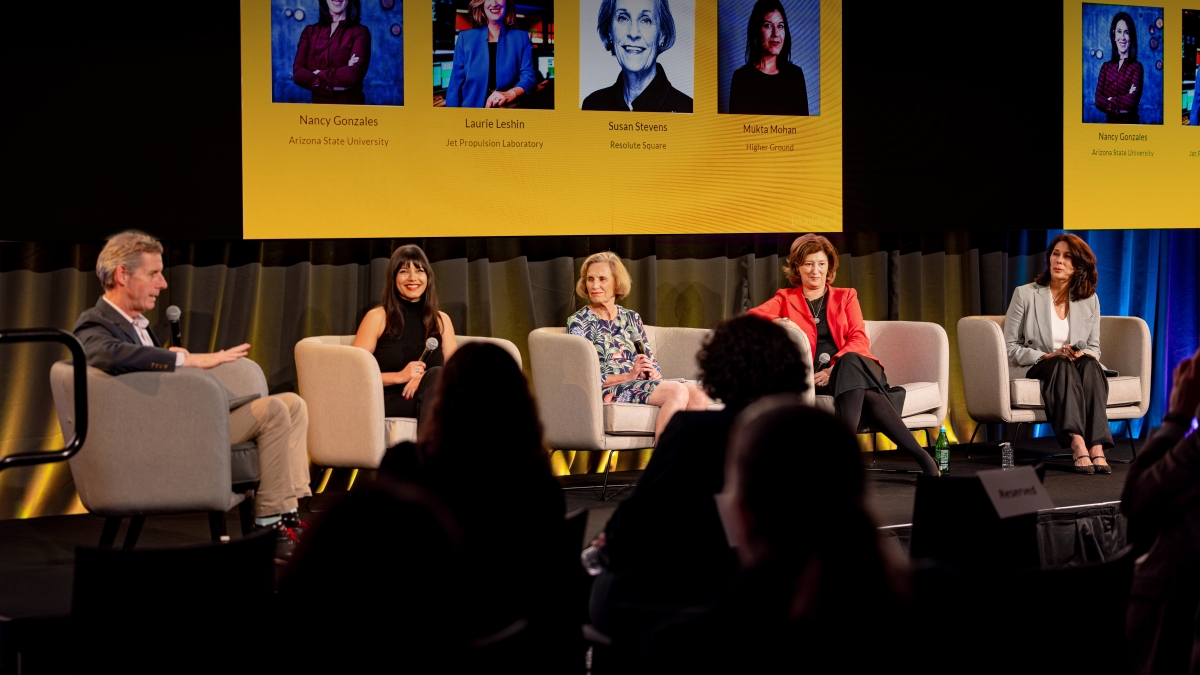
The Difference Engine at ASU hosted the Women’s Power and Influence Index launch event at ASU California Center Broadway in downtown Los Angeles on March 8. The event included a panel discussion, moderated by Kai Ryssdal (far left), host and senior editor of "Marketplace," NPR's program on business and the economy. Panelists included (from left): Mukta Mohan, deputy head of audio, Higher Ground; Susan Stevens of Umpqua Holdings Inc.; Laurie Leshin, director of the Jet Propulsion Laboratory; and Nancy Gonzales, ASU's executive vice president and university provost. Photo by Enrique Lopez
A handful of U.S. corporations rank as “trailblazers” in gender equity in the newest version of the Women’s Power & Influence Index released by the Difference Engine at Arizona State University.
The index, released March 8 at an event at the ASU California Center Broadway in Los Angeles, provides information on how 66 companies rate for variables such as pay equity, career growth, workplace standards, work-life balance and stakeholder engagement.
The goal of the index is to encourage companies to do better, according to Ehsan Zaffar, founding executive director of the Difference Engine at ASU, which released the report.
“It’s not punitive. It’s meant to be encouraging so companies do better,” he said.
“Our ethos is that we want the companies to feel there’s room for upward movement and we want the top companies to be inspirations.”
The index ranks 12 companies at the top as “trailblazers,” including American Express, Walmart, Disney and eBay. The next level, “pacesetters,” include 21 companies, including Altria and Morgan Stanley, while half the companies in the index, 33 of them including Boeing and American Tower, are “late bloomers.”
Besides the ranking information, the index is proof that a product can be developed to empower communities to fight inequality.
“We’re trying to build a new way — a third way — for communities to solve problems of inequality,” Zaffar said of the Difference Engine, a universitywide, interdisciplinary venture studio that was launched in 2021 to develop solutions to social, political and economic inequality.
The center is a partnership among the Sandra Day O’Connor College of Law, The College of Liberal Arts and Sciences, the Ira A. Fulton Schools of Engineering and the W. P. Carey School of Business.
The traditional methods of tackling inequality have been through nonprofits or through advocacy, including activism, litigation, protest, lobbying and policy work, he said.
“The third way includes entrepreneurship and innovation,” said Zaffar, who is a civil rights lawyer.
“What if the community facing the problem built a practical solution to the problem? What would that look like?”
Zaffar said the Difference Engine focuses on applied knowledge and is a “do tank” as opposed to a think tank.
So the center created the Women’s Power & Influence Index, a product to address gender inequality in the workplace. The first version was released a year and a half ago, and included basic information, such as whether a company had a maternity leave policy.
The updated version released on Friday has three times more data and is expanded to include qualitative information, such as whether a company’s maternity leave policy is good. Eventually, a third version will seek to measure compliance.
The index is important because it’s an objective measurement.
“When you publicly show how an organization is doing, research has shown that they’re more inclined to take action on the problem,” Zaffar said.
The index is based on publicly available data and the results are weighted by the results of a survey in which women rated what’s most important to them in the workplace. While the largest number of women, 36%, said that equitable pay matters most, the second-most important variable was career growth, at 22% — higher than work-life balance, at 14%.
“Career growth” would include policies such as female recruitment and professional development for women.
“We’re building the index not based on what companies say matters but on what women say matters,” Zaffar said.
“We think we’ve built the most comprehensive measure of workplace fairness in the country. And it’s open and accessible to anyone because we’re a public university.”
At the release event in Los Angeles, ASU Provost Nancy Gonzales told the crowd that by some estimates, it will take about 100 years to close the gender inequality gap in the American workplace.
“At that rate, no one in this room will see that reality. And it means that our children, and most of our grandchildren, will experience this pay inequity personally.
“We believe that acceleration must happen and tools like the Women’s Power and Influence Index can help us achieve an equitable workplace in our lifetimes,” she said.
Gonzales said that she was excited to hear that students did much of the work on the index.
“They are absolutely brilliant young minds with a built-in understanding that society must evolve toward equity.
"They have high standards for our shared future — as they should. And, they are savvy. They understand how to leverage technology and data to make positive change.”
Elisa Thomas, a student in the Thunderbird School of Global Management at ASU, has been with the Difference Engine since she was a junior in Barrett, The Honors College, when she was selected to be in the first student cohort.
“Barrett offers thesis pathway programs, and I applied to the Difference Engine because I’ve always been interested in equity-based work,” said Thomas, who is pursuing a master’s degree in global business.
As part of her Barrett thesis, she did a literature review of other indices.
“We were focused on what we could do to make the (Women’s Power & Influence Index) different from the others on the market,” said Thomas, who is now leading the student thesis teams.
“There are other equity-based indices but we wanted to separate ours via our transparency and the fact that it’s free to the public.”
Besides analyzing publicly available data, the Difference Engine students also talked with executives at some of the corporations they ranked.
“I was able to be on the call with PayPal, which was a cool experience to meet with their executives,” she said.
“We were able to show them in our presentation how they placed in terms of the criteria we were measuring and we shared what they could do to promote better equity, and we wanted to encourage them that these were good steps to be taking.”
Thomas said that as a woman embarking on a career, the index is an important tool.
“As it grows, I’ll be able to look at the landscape of the workforce and where I might land one day,” she said.
“There’s a lot of pressure on companies to implement this stuff, but there are no clear guidelines on how to make women and other minority groups happy and comfortable and respected.”
Zaffar said that one challenge for the index is the amount of data available. Companies are required by law to submit reports to the Equal Employment Opportunity Commission, but sometimes don’t file in time or don’t release the contents publicly.
“It’s a struggle because if a company chooses not to release their info, we can’t rank them on the index. They may be a great company but there’s no reliable information,” he said.
For the next version of the index, which is funded by the Henry Luce Foundation, the team will consider using artificial intelligence and machine learning.
“Collecting and verifying the data is a lot of manual labor by our students, and that’s not a great learning experience,” he said.
One goal is to make the index generate revenue, possibly by having students work as consultants with companies or by creating a customized database for journalists, investors and academics.
“We want to demonstrate to communities that the products they build can generate revenue,” he said.
More Local, national and global affairs

Arizona PBS is now free to stream for Prime Video viewers in the US
Arizona PBS is now available for streaming on Amazon Prime Video. A new partnership between PBS and Amazon brings the station’s primary, high-definition broadcast channel, along with the 24/7 PBS…

First-ever Taiwan Symposium at Thunderbird celebrates business, cultural connections
The investment by TSMC and other Taiwanese corporations in Arizona will reap dividends not only in thousands of new jobs but also in strengthened cultural connections and new methods of…

Study shows that trust drives successful market economies — but not in the way you may think
From fueling our cars to fulfilling daily coffee habits, the average U.S. cardholder makes 251 credit card transactions per year, according to Capital One.Each of these transactions are built…


